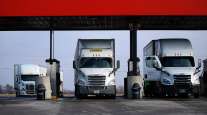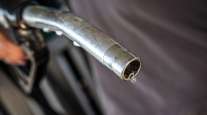House Bill Would Alter Tax on LNG to Match Federal Levy on Diesel Fuel
This story appears in the June 3 print edition of Transport Topics.
Two House members have introduced legislation to remove what they say is the disparity between the tax the federal government levies on diesel fuel and on liquefied natural gas.
Reps. Mac Thornberry (R-Texas) and John Larson (D-Conn.) introduced the LNG Excise Tax Equalization Act of 2013 on May 23 in their drive to bring the costs in line.
“This bill provides a fair, market-centered solution to fix the tax disparity between diesel and LNG,” Thornberry said in a statement. “I think this change will encourage more private-sector investment in LNG infrastructure and production, and that will be a real positive effect on our economy.”
Currently, a gallon of LNG is taxed at the same rate as diesel — 24.3 cents a gallon — with the proceeds going into the Highway Trust Fund to maintain the nation’s road system. Diesel buyers actually pay 24.4 cents at the pump because there is one-tenth of one cent additional tax that goes into the underground oil tank storage fund.
However, because it takes 1.7 gallons of LNG to produce the same amount of energy as a gallon of diesel, the bill’s sponsors say the effective tax on LNG is much higher than on diesel.
In order to buy a quantity of LNG with the same energy equivalent as diesel, LNG buyers pay a levy of about 41 cents, or nearly 70% more in tax, said Glen Kedzie, American Trucking Associations’ assistant general counsel.
In other words, Kedzie said, a truck burning LNG would end up paying 41 cents in taxes to go the same distance that an identical truck would pay about 24.3 cents for if it was burning diesel instead.
“The road doesn’t know the fuel type,” Kedzie said, and the wear-and-tear is identical. “From an equity standpoint, all fuels are not being treated equally.”
If the bill becomes law, the tax on LNG would be the same as diesel because the LNG tax would be based on equivalent energy as measured in British Thermal Units. Compressed natural gas, or CNG, is already taxed that way but at the energy equivalent for gasoline.
“ATA is reviewing the bill and plans to take a position on it this week,” said Mary Phillips, ATA’s senior vice president in charge of legislative affairs.
Natural gas is a fossil fuel that generates fewer air pollutants and greenhouse gases than diesel. It becomes liquefied by cooling it to minus 260 degrees Fahrenheit.
If LNG and diesel taxes are equalized, LNG supporters said the change will be beneficial to trucking, the natural-gas industry and other companies.
“Companies are already beginning to make the switch towards natural-gas vehicles, and this bill will knock down a significant barrier preventing companies from further harnessing this domestic energy source,” Rep. Larson said in a statement.
“By leveling the playing field for LNG trucks, we are taking an easy step towards utilizing clean, affordable and American energy,” he said.
As law, the measure would “expedite a transition currently taking place and allow the trucking industry to take advantage of cleaner, cheaper and abundant natural gas,” Clean Energy Fuels President Andrew Littlefair said in a statement responding to the Thornberry-Larson bill.
Seal Beach, Calif.-based Clean Energy is building a network of about 150 natural-gas filling stations along the nation’s highways.
A companion bill is expected in the Senate.




